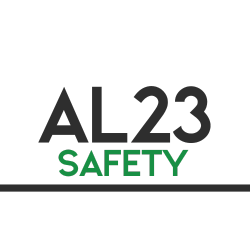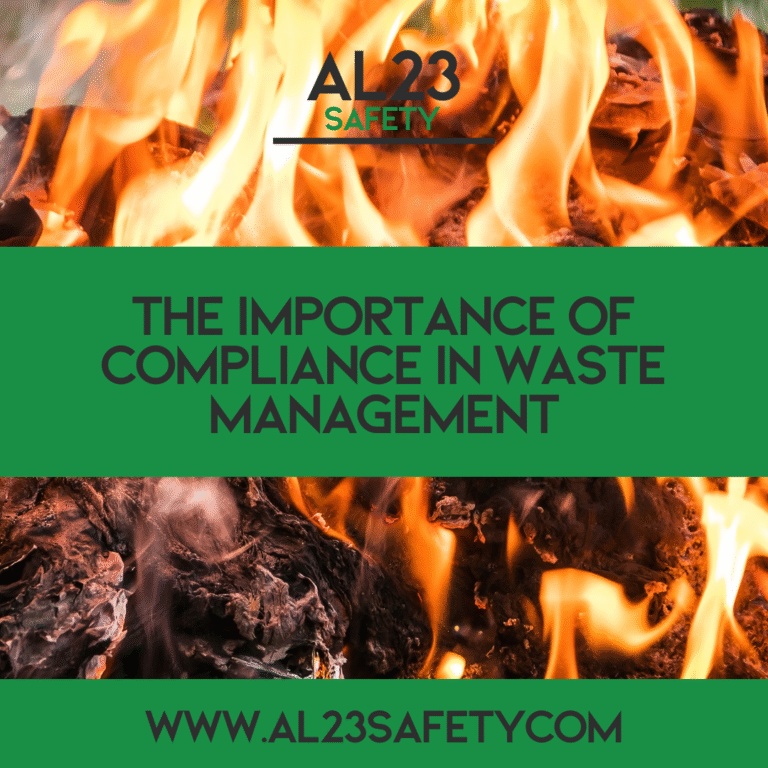Waste management compliance is the cornerstone of safe and sustainable operations in the UK waste industry, yet its importance is often overlooked until disaster strikes. The recent sentencing of former waste director Oliver Kirkbride for illegal waste storage at a Lancaster site serves as a harrowing example of the consequences of non-compliance. In December 2023, a massive fire erupted from thousands of tonnes of combustible waste stored in breach of regulations, racking up over £2 million in firefighting and clean-up costs borne by emergency services and local authorities. This incident not only disrupted the community for weeks but also highlighted the devastating environmental and financial risks of ignoring waste management compliance. At AL23 Safety, we specialise in helping businesses navigate these challenges to prevent such catastrophes. In this post, we explore five critical lessons from the Lancaster fire, drawing on UK regulations to guide you towards robust environmental compliance waste practices.
The Devastating Impact of the Lancaster Fire: A Wake-Up Call for Waste Management Compliance
The fire at the Lune Industrial Estate, linked to A1 Supa Skips under Kirkbride’s direction, began as a deep-seated blaze in compacted waste that burned for nearly three weeks. Thick plumes of smoke blanketed nearby homes, forcing evacuations and halting local businesses. The site held up to 13,000 tonnes of commercial waste far exceeding the permitted 500-tonne, seven-day limit, despite repeated enforcement notices from the Environment Agency (EA). Kirkbride continued operations even after the site’s permit was suspended in February 2022 due to fire risks, and fully revoked in November 2022.
This breach led to his guilty plea on seven counts, including depositing controlled waste without a permit under the Environmental Protection Act 1990 and violating the Environmental Permitting (England and Wales) Regulations 2016. On 15 August 2025, Preston Crown Court sentenced him to 16 months’ imprisonment (suspended for 12 months), 200 hours of unpaid work, and a five-year ban from directorships. The EA emphasised that such “waste criminals” destroy communities and environments, underscoring why waste management compliance is non-negotiable.
Beyond immediate dangers, illegal waste storage risks long-term harm: polluted air, soil contamination, and threats to public health. With UK waste production rising, over 200 million tonnes annually, the pressure on sites intensifies, making adherence to waste storage regulations UK even more urgent. Businesses ignoring these rules face not just fines but reputational damage and operational shutdowns.
Understanding the Legal Framework for Waste Management Compliance
At the heart of UK waste management compliance lies a robust legal structure designed to safeguard the environment and public. The Environmental Permitting (England and Wales) Regulations 2016 mandate strict controls on waste storage, processing, and disposal, requiring operators to secure permits outlining exact limits on waste types, quantities, and durations. These regulations, enforced by the EA, prohibit storing combustible materials beyond safe thresholds to prevent fires and pollution.
The Environmental Protection Act 1990 further criminalises unauthorised waste deposits, with penalties including unlimited fines and imprisonment. Kirkbride’s case exemplifies how deliberate non-compliance, operating unpermitted sites and defying suspension notices, escalates minor violations into major incidents. Businesses must conduct thorough risk assessments, maintain records, and respond promptly to EA inspections. Failure to do so invites enforcement actions, from warning letters to site closures.
Moreover, the Health and Safety at Work etc. Act 1974 intersects here, obliging employers to mitigate fire risks in waste handling. Integrating these laws into daily operations ensures environmental compliance waste isn’t a box-ticking exercise but a proactive strategy for resilience.
5 Essential Lessons from the Lancaster Incident on Waste Management Compliance
Drawing directly from Kirkbride’s failings, here are five actionable lessons to bolster your waste management compliance and avert fire prevention waste sites disasters:
1. Master Your Environmental Permits for Ironclad Waste Management Compliance
Permits aren’t optional paperwork they’re your blueprint for legal operations. Kirkbride stored waste 26 times over limits, ignoring permit conditions. Businesses should regularly review permits, ensuring storage aligns with specified volumes and timelines. Conduct site audits quarterly to verify compliance, and update permits for any operational changes. This vigilance prevents the “accumulation creep” that sparked the Lancaster blaze.
2. Implement Proactive Risk Management to Sidestep Illegal Waste Storage Risks
The EA flagged fire hazards in 2022, yet operations persisted, leading to abandonment and ignition. Adopt a risk management framework: map high-risk areas, segregate combustibles, and install suppression systems like sprinklers or foam monitors. Use digital tracking for waste inflows to stay under limits, and simulate emergency drills to prepare for worst-case scenarios. Proactive measures transform potential pitfalls into managed routines.
3. Prioritise Training and Awareness to Embed Waste Storage Regulations UK
Untrained staff contributed to unchecked waste buildup in Lancaster. Mandate annual training on regulations, hazard recognition, and reporting protocols. Engage all levels from operators to directors, in workshops covering the Environmental Permitting Regulations. Certifications like the Chartered Institution of Wastes Management (CIWM) courses build a culture of accountability, reducing human error in high-stakes environments.
4. Leverage Expert Consultants to Strengthen Environmental Compliance Waste
Navigating complex laws solo is risky, as Kirkbride’s isolation showed. Partner with specialists like AL23 Safety for bespoke audits, permit applications, and compliance roadmaps. Our team provides on-site assessments, training programmes, and ongoing monitoring to align your practices with EA standards. This external expertise not only mitigates risks but also uncovers efficiencies, saving costs long-term.
5. Foster a Culture of Accountability to Combat Illegal Waste Storage Risks
Directorial oversight failed spectacularly here, with Kirkbride defying notices under multiple companies. Instil board-level responsibility through compliance dashboards and whistleblower policies. Report breaches immediately to the EA via their hotline, and integrate ESG (Environmental, Social, Governance) metrics into performance reviews. A transparent culture deters shortcuts and builds trust with regulators and communities.
Broader Implications: Building a Safer Waste Sector Through Compliance
The Lancaster fire’s £2 million toll, covering Lancashire Fire and Rescue Service efforts and Lancaster City Council clean-ups ripples beyond finances. It strained public resources, eroded community trust, and amplified climate vulnerabilities amid rising UK waste volumes. Yet, positive shifts are possible: adopting circular economy principles, like recycling targets under the Waste Framework Directive, can reduce storage needs and fire risks.
For SMEs, compliance might seem burdensome, but tools like the EA’s online permit portal simplify adherence. Larger operators benefit from integrated software for real-time monitoring, ensuring waste management compliance evolves with industry demands.
Partner with AL23 Safety for Unwavering Waste Management Compliance
The Oliver Kirkbride case is a stark warning: neglecting waste management compliance invites disaster, but embracing it unlocks security and sustainability. At AL23 Safety, we’re passionate about empowering UK businesses with tailored fire safety and environmental solutions. From compliance audits to risk training, our experts ensure you’re not just meeting regulations, you’re exceeding them.
Don’t wait for a fire to learn these lessons. Contact AL23 Safety today for a free consultation on your waste operations. Visit our services page to safeguard your site, protect your community, and future-proof your business. Together, we can turn compliance from a chore into your greatest asset.



